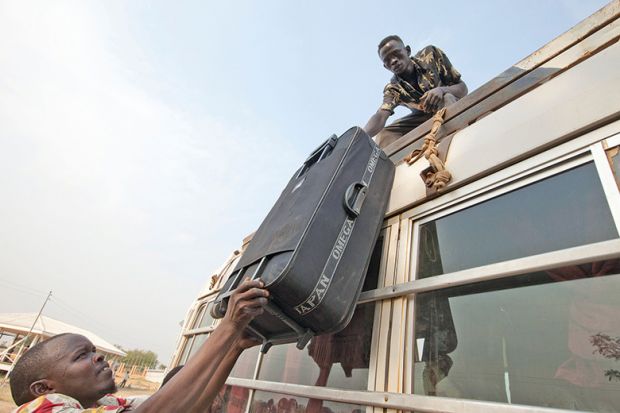Last month, a university in Zimbabwe suspended South Sudanese students from attending lectures or using facilities such as the library.
The students were on a South Sudan government scholarship, agreed with the Zimbabwean authorities in 2014. The scholarship covered tuition fees and monthly bursaries, and this particular university resorted to the suspension after the government failed to pay tuition for some 155 students enrolled in universities in Zimbabwe.
There are more than 20,000 South Sudanese university students studying abroad – more than the population of university students inside the country. The vast majority of these students are found in the Sudan, Egypt, East Africa and Ethiopia. Also, a significant number are enrolled in South Africa, Botswana and Zimbabwe.
The disturbing experience of South Sudanese students in Zimbabwe highlights wider difficulties encountered by many of their peers in other countries. For instance, South Sudanese university students in Sudan and Egypt (about 14,000, the largest group of South Sudanese students abroad) have not received their stipend for almost two years.
The problems of the students abroad are complex, but they are inseparably linked to a phenomenal demand for higher education in South Sudan and the government’s inability to provide it domestically. The peace ushered in by the Comprehensive Peace Agreement (CPA) in 2005, after two decades of conflict, opened up education in South Sudan for the first time in two decades.
Demographically, South Sudan, like most sub-Saharan African countries, is a young country. More than half the population is under the age of 24. Recent projections from the National Bureau of Statistics indicate that in 2017, almost 7 million South Sudanese are under the age of 19. This exerts enormous pressure on the education services.
National higher education institutions were unprepared for this overwhelming quest for university education. At the time, the three existing public universities were in Northern Sudan, and there was limited capacity to absorb the demand.
To help overcome this problem, the government expedited repatriation of the universities to the South. But even after the universities were re-established, their limited capacity meant that some successful students could not find places. They sometimes wait for two or three years after completing secondary school before being admitted to university. Consequently, the government encouraged students to enrol in universities abroad.
Most of the students in Zimbabwe are registered for science-based specialisations, which are either unavailable or underdeveloped in South Sudan. These include chemical engineering, other engineering specialities, agriculture, medicine, biochemistry, dentistry and pharmacy.
The problems of the students abroad are complex, but they are entwined with the present national crisis in South Sudan. In recent years, the country has been bedevilled by political and economic upheavals, with dire consequences and an uncertain future for its higher education sector.
The fragile economy, exacerbated by the current conflict, undermined the government’s ability to fund education in general, and especially universities and students abroad. South Sudan’s economy depends almost exclusively on oil. The ubiquitous volatility in the prices of crude oil and the sharp reduction in oil production – an impact of the war – have contributed to a contraction of the economy.
Government higher education spending since independence consistently lingers below 1 per cent of the annual budget. Public universities do not have the money to function properly. South Sudanese university students abroad have arguably become collateral damage of the interplay between the war and economic circumstances. They are left in limbo through no fault of their own.
To be fair, the authorities in the Ministry of Higher Education are frantically working to resolve the problem of the students broad. They approached their foreign counterparts for assistance. Ethiopia, Sudan and Egypt responded positively. President Bashir of Sudan issued a decree in January 2017 granting South Sudanese students in his country non-foreign status. The Egyptian and Ethiopian authorities on their part compassionately offered scholarships to the students. In addition, Egypt reduced tuition fees of self-sponsored South Sudanese students in government universities by 90 per cent.
These measures will definitely ease the difficulties for some students in these countries, but they do not solve all their major financial difficulties.
Some of the South Sudanese students in Zimbabwe are due to graduate next year. But the dreams of these students could be shattered. The local media in South Sudan are inundated with stories of helpless parents exasperated by the condition of their vulnerable children marooned in Harare’s South Sudanese embassy. The Zimbabwean university in question, in a correspondence to the South Sudanese Embassy in Harare, admitted that taking this "unfortunate decision" may be to "the detriment of students' academic progress”.
University education should be a joyous and stimulating experience. But the ordeal of the students in Zimbabwe and elsewhere illustrates that the experience of the South Sudanese university students abroad is anything but. They are caught between a rock and hard place.
Although the war and the weak economy imperil students’ university education, solutions to this complex issue are far from simple. But the encouraging actions of the Sudanese, Ethiopian and Egyptian governments appear to have offered some respite for the students. I wish the Eastern and Southern African countries would do the same.
Kuyok Abol Kuyok is associate professor in the College of Education at the University of Juba, South Sudan.




